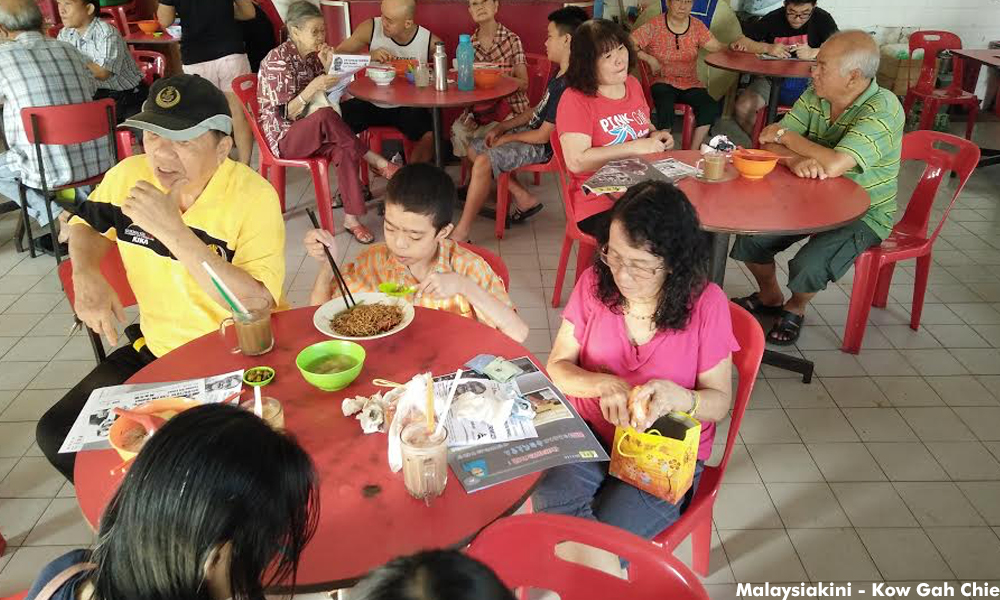
The moon last night was a dying crescent, before dawn it all but vanished. Any thief could steal without notice. This is the ungodliest hour, the most unsuspecting.
I don’t know how I am in this coffeeshop so early in the morning. The clock in this medium-sized coffeeshop is small and old. It ticks in an inconsistent rhythm, but I can tell it’s almost 6.30am.
The whole place is silent. Thick, assorted dust brushes down from the yellow-stained fan above me. Just when I am about to change my seat, my noodles arrive. The hand gripping the plate is coarse and brown, with visible marks of cuts and ring-shaped pigments of paler colour.
I look up at him. The white and black in his eyes seem only placed for utility purposes; there is nothing inside, his eyes are deadened. A cylindrical scar stretches from his neck to his forearm like a wounded soldier in a war. I ask him how much my noodles cost. He raises both hands slightly and puts them down again, and looks away.
“How much?” I ask.
“Ten ringgit!” he answers.
“Wow, that’s really expensive.”
“If you don’t want to eat, go somewhere else. Don’t come here and complain!”
My body shakes a little in fear - mostly from the unexpectedness of being shouted at this early in the morning. I eat my noodles. In front of me is a large metallic building shaped like a curved knife. Two blinking lights on the left and right give the building a terrifying face.
I look at the drinks refrigerator, full and untouched. Its colours too have faded. I am told not to open it. An uncle with a Fu Manchu moustache whispers: “Don’t wake up the GST monster.”
Expensive, expensive, expensive!
The noodles that swim in the dark sauce are soggy upon first contact with the liquid; the dark sauce is too thin to be absorbed by the noodles; the fish cake breaks under a few touches; the vegetables are dry and have turned yellow.
The common theme is obvious: Costs are rising, so the hawker has replaced everything with cheaper products. The result is a remarkable compromise in quality.

The hawker walks back to his modest stall that reads “Chan Noodles” and shouts in Cantonese at his friend seated in front of his stall.
“Expensive, expensive, expensive! That is all the customers know of. The government is raising the price of everything, how am I supposed to sell my noodles cheap!”
His friend in front of him nods. Occasionally he puffs his finger-length paper cigarette and exhales smoke from his nose like a dragon. With only a precious few strands of white hair left on his head, his look is grim with an arrogance of old age.
“Since GST, you’d be lucky to survive. My friends who own small businesses are willing to close shop than make a loss because of it. For GST you pay when you make a profit, you also pay when you make a loss. What logic is that?” his friend says in response, as he throws his eyes sideways.
Stories on the ground
This is not the first time I have heard about something like that. While most analysts talk about the efficiency and necessity of GST in this country on a macro level, the stories on the ground never make it to the mainstream discussion. Souvenir shops, spare parts shops, pharmacies, clinics - they are all closed as people put away their spending.
I look around me. The faces of the hawkers are unpleasant, with hardly anyone managing a smile - if any, only a reluctant smile of utter helplessness.
A twitching uncle is chopping cucumbers like a demon. You have to chop faster when the costs have risen so you can sell more for less. Chop cucumbers, chop fingers; cut costs, cut fingers.
The Chinese auntie in her 80s sits at the back of the only counter of this place. Behind her is a fan that rotates in stiff motions. Her curly grey hair blown from behind turns into an enveloping hibiscus or a fierce lioness. She looks afar in contemplation.
Never did she envisage that a life worked so hard for so long wouldn’t be enough to spare her from financial hardship at the last mile. She stands up from her rotating stool and walks to grab a loaf of Gardenia bread at the counter table. She is a small woman with a hunched back; the veins that protrude from her legs seem less painful compared to her swollen feet.
She climbs back up to her stool, slowly stares at her bread, breaks off the side and puts a sizeable piece into her mouth. Her mouth is moving but her mind is not in rhythm. Her long nails scratch her cheeks before touching a halved wintermelon to clean it. She must be thinking of something-something about money.
I leave the place by passing through the aisle between two other hawker stalls to avoid Angry Chan Noodles. Oil and wastewater flow from the bottom of the stalls into the drain. When I turn, I am shocked by the man sitting behind a corner peeling prawn shells. I look at him: His hair is unruly, his clothes give off a pungent smell of humid weather, and his fingers are as dirty as they can be.
He lifts his head up, and his eyes are only lines of blood. I imagine him giving a prediction of horror by saying: “It’s coming, it’s coming, the deadly GST is coming.”
JAMES CHAI works at a law firm. His voyage in life is made less lonely with a family of deep love, friends of good humour and teachers of selfless giving. This affirms his conviction in the common goodness of people: the better angels of our nature. He tweets at @JamesJSChai.- Mkini



No comments:
Post a Comment
Note: Only a member of this blog may post a comment.